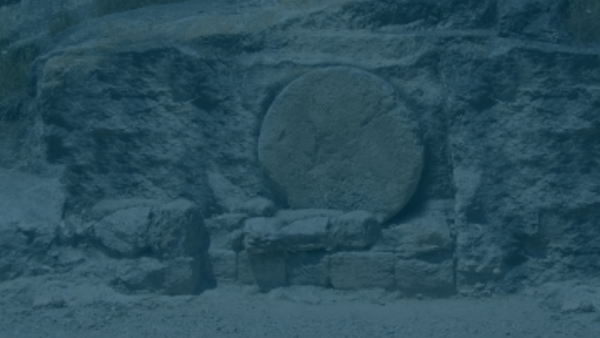Today’s devotional includes a practice known as Visio Divina, or ‘divine seeing,’ in which we prayerfully invite God to speak to us as we gaze at an image. This can be a work of art, a photograph, or something in nature. The desire is to encounter God’s presence in what we see and to respond. It is often practiced alongside Lectio Divina, or ‘divine reading,’ inviting us to contemplate the text also through the eyes of the artist, whether on our own or with others.

As you begin, pause, take a deep breath, and ponder the painter’s portrayal. Invite the Spirit’s leading and focus your attention on the text.
When it was evening, there came a rich man from Arimathea, named Joseph, who was also a disciple of Jesus. He went to Pilate and asked for the body of Jesus; then Pilate ordered it to be given to him. So Joseph took the body and wrapped it in a clean linen cloth and laid it in his own new tomb, which he had hewn in the rock. He then rolled a great stone to the door of the tomb and went away. Mary Magdalene and the other Mary were there, sitting opposite the tomb. (Matthew 27:57–61 NRSV)
What words or phrases stand out to you? What is the Spirit highlighting? Why do you think they are catching your attention?
Imagine being Joseph of Arimathea—going to Pilate, taking Jesus’s body down from the cross, wrapping, carrying, and burying him.
What’s going through your mind? What’s happening with your heart?
Imagine sitting with the Marys. How are you feeling? What are you thinking?
All is silent. The world – your world – has changed. Jesus is gone. His body lies buried in a borrowed tomb sealed with a great stone.
Pause and ponder the artwork again. How does it make you feel?
It’s ‘Black Saturday’ – the day in-between, a day of uncertainty, of darkness and loss – a day in which we don’t know what to do.
Perhaps all we can do, perhaps all we should do, is sit with his followers in the grief and lament, shock and dismay of Jesus’s death.
There was a day we held our breath
[. . .]
And felt the sting of bitter death
When all our hopes were buried in the grave
And grace was in the tension
Of everything we’ve lost
Standing empty handed
Shattered by the cross[1]
‘Standing (or sitting) empty-handed’ is hard. Yet, perhaps that’s the point. Perhaps the struggle and sting of holding our breath in silence and darkness is one way we are bound together with all humanity, and with all creation as she groans as in the pains of childbirth (Romans 8:22).
Perhaps our waiting is also a reminder that a seed must be buried deep in dark soil for a time, sometimes a long time, before it can burst forth with new life . . . and that new life is not up to us.
Thus it is also in the waiting that we learn to hope and trust that one day soon, light and life will come.
In the meantime, on this (and other) ‘Black Saturdays,’ may we sit with one another, and all the earth, keeping vigil as we wait and pray.
We pray for neighbours and others whom we know who are suffering, sick, isolated, anxious, afraid.
We pray for those who have lost a loved one or suffered other losses this year.
We pray for our own lament and grief.
We pray for a groaning creation.
We pray for the sprouting and growth of the Kingdom seeds God has and is planting in our neighbourhoods, communities, and world.
We pray we may have eyes to see and hearts to receive “your Kingdom come, your will done on earth as it is in heaven.”
Lord, hear our prayers.
We hope in You. We trust Your promises.
We embrace the mystery of life, death, burial, and resurrection.
And wait with eager longing for the day when you will make all things new! Amen.
“Nothing that has not died will be resurrected.”
—C. S. Lewis
[1] From “Buried in the Grave;” lyrics and music by Leslie Jordan, David Leonard, and Mia Fieldes; performed by All Sons and Daughters).
Dr. Karen Wilk is on the NAB Missional Initiatives Team and lives in Edmonton, Alberta.